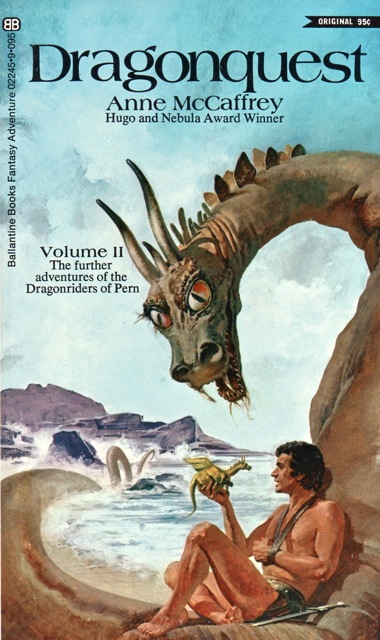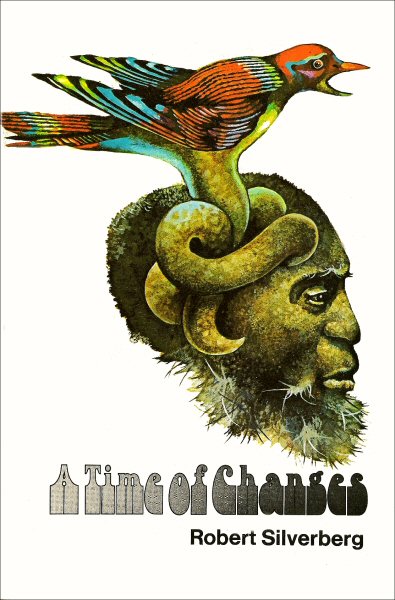The Nominees

To Your Scattered Bodies Go by Philip Jose Farmer

The Lathe of Heaven by Ursula K. Le Guin

Dragonquest by Anne McCaffrey

A Time of Changes by Robert Silverberg

Jack of Shadows by Roger Zelazny
The Actual Results
- To Your Scattered Bodies Go by Philip Jose Farmer
- The Lathe of Heaven by Ursula K. Le Guin
- Dragonquest by Anne McCaffrey
- Jack of Shadows by Roger Zelazny
- A Time of Changes by Robert Silverberg
How I Would Have Voted
- The Lathe of Heaven by Ursula K. Le Guin
Explanation
Cover art was so terrible in the 70s. Those are all the original edition covers for each book. They’ve all been reworked in later years, and most of them got a significant upgrade.
The Lathe of Heaven isn’t Ursula K. Le Guin’s greatest work, but I did find it to be decently good. The ending was a little too pat, but the set up was good, and the story itself was quite intriguing. In some ways, I feel that it would have worked better as a movie, maybe an animated feature by Studio Ghibli. It definitely had that kind of a dreamlike feel.
The rest of these books are not that great, to be honest. To Your Scattered Bodies Go and A Time of Changes were too pervy for me, with Farmer indulging in some really weird and disturbing treatment of children, and Silverberg indulging in pages and pages of navel gazing, all written very beautifully and signifying almost nothing, which is typical of Silverberg.
Jack of Shadows was confusing: I got about two thirds of the way in before I realized that I had no idea what was happening, and I didn’t really like any of the characters. I wonder if the real reason this book got nominated was because so many people enjoyed Nine Princes in Amber, the first Chronicles of Amber book, which came out in 1970 and was actually quite excellent. But he was writing and publishing the Chronicles of Amber all through this time period, and none of them ever got nominated for a Hugo, which seems really strange to me. With Zelazny, the only books I’ve found that I enjoyed are his Chronicles of Amber, and everything else is a huge miss for me. It’s weird.
As for Dragonquest, I know that the Dragonriders of Pern books have lots of fans, and I don’t find anything too objectionable with them (aside from the naively libertine Boomer attitudes toward sex, which is par for the course for this era and for Anne McCaffrey in general), but I just couldn’t get into this book. I read the first Dragonriders of Pern book in college, when I wasn’t nearly so cynical, and I thought it was okay, but it wasn’t compelling enough to go out and read the rest of the series immediately, and over the years I literally forgot everything that happened in that first book. So I read a synopsis before picking up book 2, and I just have to say that the dragons are way, way, way too OP. Seriously, they can teleport instantly through space AND time? That’s just too much. So I went into Dragonflight without feeling any real sense of peril, and right away, the novel turned into a giant soap opera about the various dragons and dragonriders: who had feelings for who, who was sleeping with who, etc etc. So after a couple of chapters, I just got bored and checked out.
So the only one of these books that I can positively vote for is The Lathe of Heaven, even though I think it pales next to Le Guin’s other work. But I wouldn’t actually put any of these books beneath No Award, since most of it is probably just a matter of my own personal taste. The perviness of To Your Scattered Bodies Go almost makes me want to put it below No Award: there’s a lot of graphic nudity, a lot of innuendo, and some innuendo / torture porn directed toward children, which was why I DNFed it. But it doesn’t cross over into outright pornography, and it’s not ideologically possessed in the way that most of the stuff coming out today tends to be. Also, the premise is pretty interesting: it’s in the execution where it all falls apart.
The 70s was a really weird time for science fiction. I wonder how many of the Worldcon attendees in 1972 were high on drugs—or whether some of these artists weren’t off their gourds when they wrote some of this stuff. I’ve heard stories about some of the orgies that Asimov used to hold in his con suite. It was a very different time.
FYI, there was a 1980 live action TV movie of The Lathe of Heaven. https://www.imdb.com/title/tt0081036/. I remember watching it on DVD about 15-20 years ago.
As for Robert Silverberg, I would recommend two novels from a few years before this, Nightwings (1968) and Downward to the Earth (1970). Both are about quests for personal redemption across a dying Earth and a decolonized alien planet, respectively.
Thanks for the recommendations, Raymund. I’ll have to check those out and see if I like those better than Silverberg’s Hugo-nominated stuff. It’s funny: as I mentioned with Zelazny, I do tend to prefer an author’s non-award-winning books over their books that end up running the gauntlet for the awards.
I’m enough of an optimist and a Zelazny fan to believe you just haven’t found the right books for you. If you (or any reader) want to give Zelazny another try, I would suggest any of these four:
Roadmarks. Sf action on a time travel superhighway. The only stylistic tricks are that all chapters are numbered One (if on the highway) or Two (if in some moment in history). And skim the French poetry, you won’t miss anything.
Dilvish, the Damned. Sword & sorcery shorter works about a hero who comes back from being wrongly imprisoned in hell and seeks revenge on the evil sorcerer responsible. Followed by a novel, The Changing Land.
Home is the Hangman. Hugo winner for best novella in ‘75 or so. Speculations on AI, big data, personal privacy, wrapped up in a noir tinged detective story.
Lord of Light. His most epic work other than Amber. Won Hugo and/or Nebula ~ ‘68. Backstory is the STL crew became the ruling class over the colonists after settling their new world – the twist is the colonists were from India so the crew emulated the Hindu gods. Except one crewman decides to bring down the system. Non-linear story: it starts near the end of the timeline, then jumps back to the hero’s earlier, failed rebellions, then picks up with the final battle.
Hope this helps!